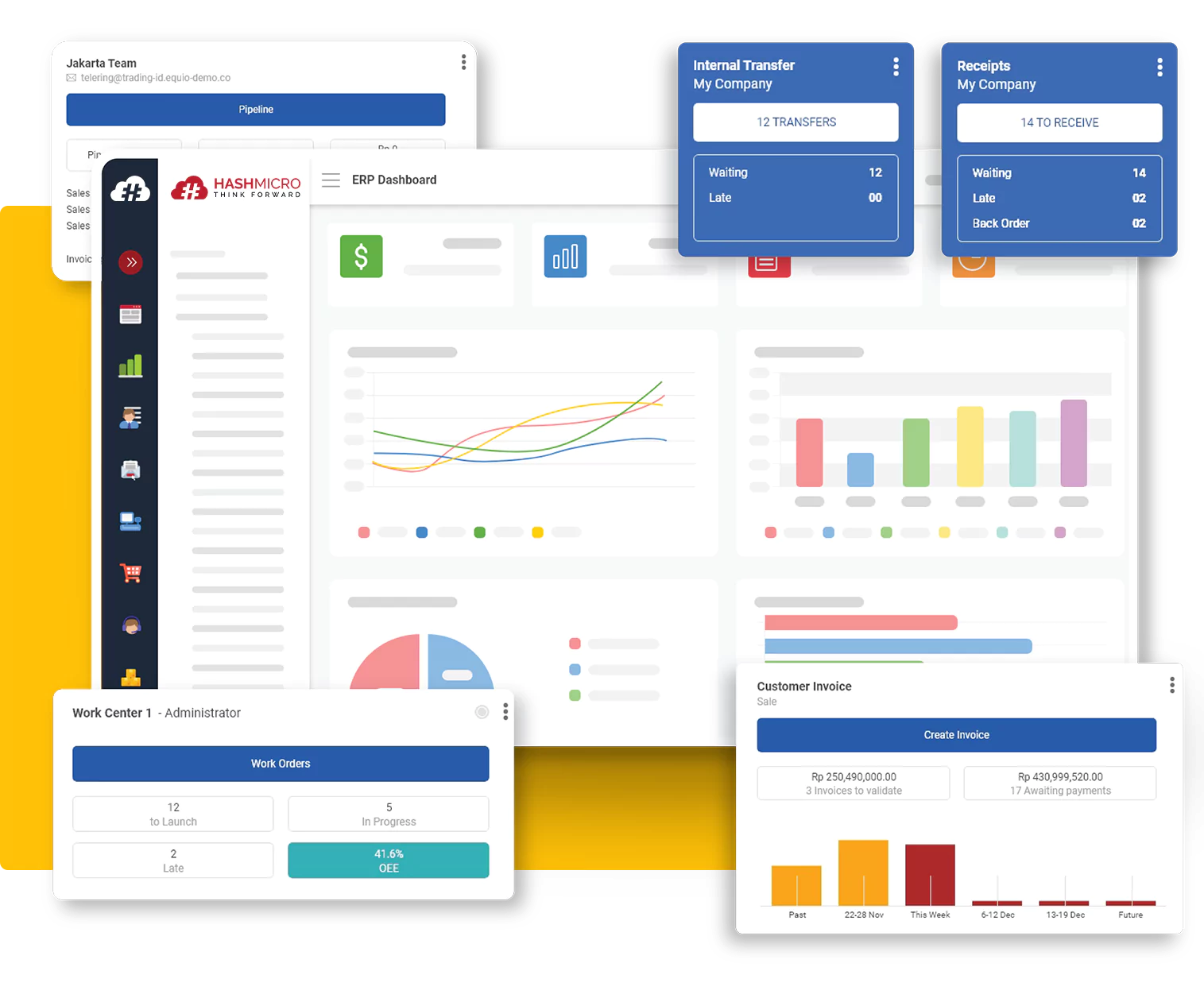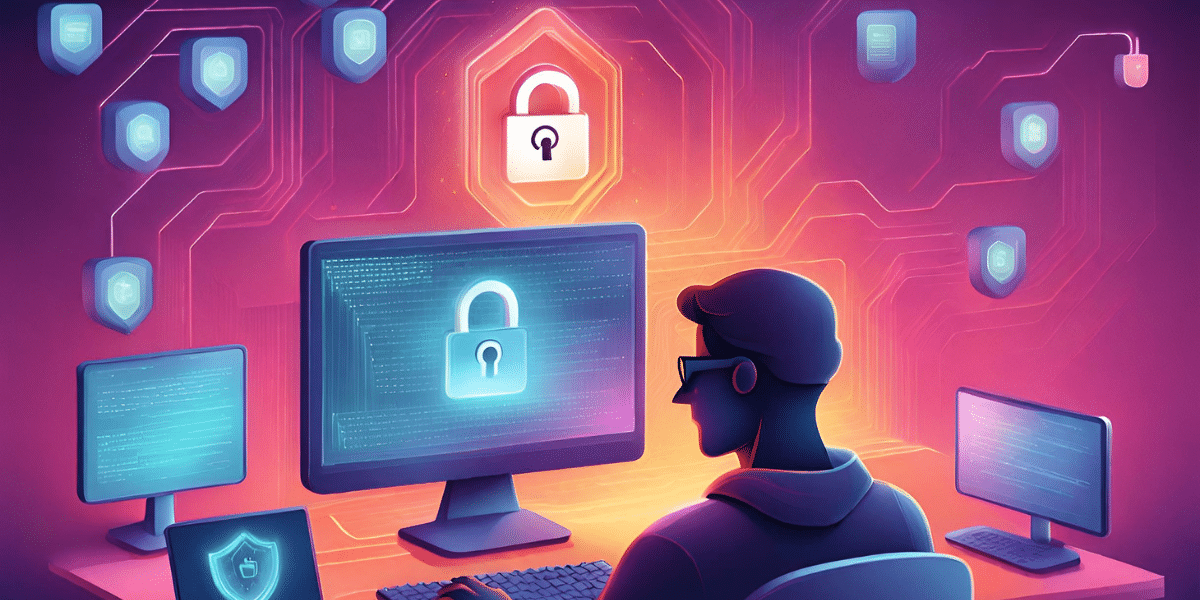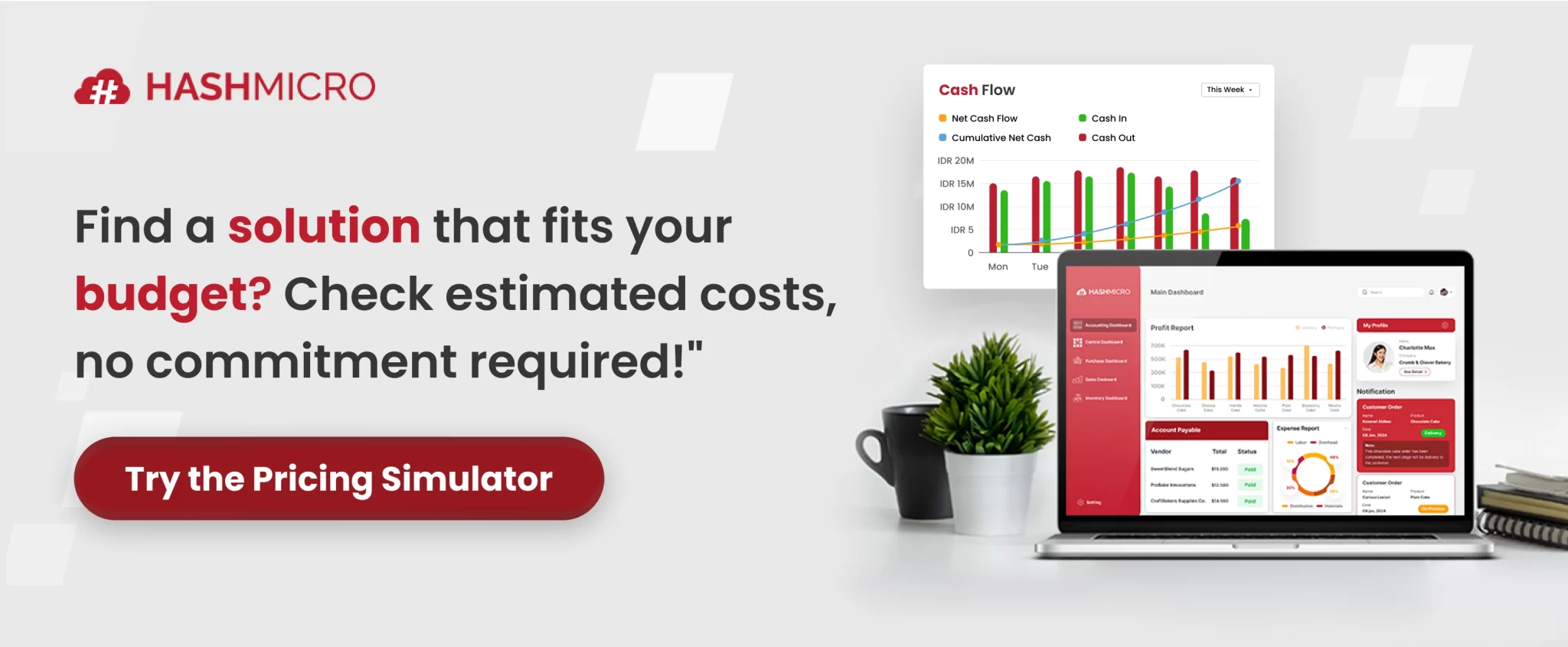When I first implemented an ERP system for my business, I quickly realized that protecting sensitive data was just as important as improving efficiency. Without proper security measures, even the most streamlined operations could be vulnerable to breaches.
That’s when I discovered how ERP System provides not only centralized management but also robust data protection features to safeguard critical business information. Data security in ERP systems is essential for protecting financial records and operational data.
By following best practices and leveraging a secure ERP system, businesses can maintain operational efficiency while minimizing risk. For those interested in experiencing how it works firsthand, you can try a free demo.
Key Takeaways
|
Understanding ERP Systems
ERP applications, from finance, human resources, supply chain, and customer relationship management, streamline processes and enable businesses to manage large-scale operations across multiple locations, connecting employees and third-party vendors worldwide.
Although ERP systems include basic security controls, they often lack the fine-grained protections needed to meet strict regulations like GDPR and CPRA, which require privacy measures and internal controls at the field, transaction, and master data levels.
The Importance of Data Security in ERP Systems
Why Data Security Matters in ERP
ERP systems are the backbone of many modern businesses, serving as a centralized platform for managing crucial data, processes, and resources. In these intricate digital ecosystems, data security is of utmost significance for several compelling reasons:
- Confidential Data: “ERP systems typically house a plethora of sensitive information, including financial records, customer data, and proprietary intellectual property. A breach of this confidential data can have severe consequences, leading to financial losses and legal complications,” says Andy Fryer, Co-Founder at Easy Signs.
- Regulatory Compliance: Many industries are subject to strict data security regulations and compliance requirements. Failing to meet these standards can result in legal consequences, fines, and severe damage to an organization’s reputation.
- Reputation Protection: A data breach can tarnish an organization’s reputation and erode trust with customers, partners, and stakeholders. Rebuilding trust and regaining lost credibility can be a long and arduous process.
- Operational Disruption: Data breaches can lead to operational disruptions, resulting in downtime, revenue loss, and potential chaos within the organization. The cost of restoring normalcy can be exorbitant and damaging.
Common Threats to ERP Data
To effectively protect data, it’s crucial to be aware of the common threats that can compromise data security in ERP systems:
- Unauthorized Access: “Hackers and malicious actors attempting to gain unauthorized access to sensitive data through various means, including exploiting vulnerabilities and weak access controls,” says Jeremy Biberdorf, CEO at Modest Money.
- Phishing: Employees fall victim to phishing attacks, which often involve tricking individuals into revealing sensitive information, such as login credentials or financial details.
- Insider Threats: “Malicious actions or negligence by employees, contractors, or other insiders within an organization can compromise data security, intentionally or unintentionally,” says Janki Mehta, Director at Certera.
- Data Leakage: Unintentional data leakage, such as sending sensitive information to the wrong recipient, can occur due to human error or inadequate security measures.
- Malware: The introduction of malware, such as viruses, ransomware, or spyware, can lead to data theft, system disruption, or other malicious activities.
Best Practices for Data Security in ERP

In light of the critical importance of data security in ERP systems, organizations must adopt a comprehensive set of best practices to safeguard their digital assets and maintain business continuity.
A key aspect of this is providing GDPR training for all employees to ensure compliance and data protection awareness.
Robust Authentication and Access Control
“Implementing robust authentication mechanisms and access control is essential. This includes multi-factor authentication (MFA) to add an extra layer of security and strong password policies to prevent unauthorized access.” says Harvey Moore, Head of Marketing at IGET Australia.
Regular Updates and Patch Management
Keeping ERP software and related systems up to date with the latest security patches is imperative. Cyberattacks often target vulnerabilities in outdated software, and regular updates can help mitigate these risks.
Additionally, external attack surface management enhances proactive defense by identifying and mitigating potential risks.
Employee Training and Awareness
“Educating employees about the importance of data security is a fundamental element of safeguarding ERP data. Training should cover how to recognize and respond to phishing attempts,” says Sean Frank, CEO of LA Police Gear.
Employees should be trained on how to spot phishing emails, avoid social engineering attacks, and take care of cybersecurity by using VPNs on personal devices.
Educational institutions can benefit from implementing a comprehensive cyber security solution for education to protect sensitive student data and research information stored in their ERP systems.
To enhance the security further, it can be beneficial to understand the differences between static and dynamic IP addresses, as explained by GoodAccess.
Encryption
Utilizing encryption to protect data both in transit and at rest is a non-negotiable practice, much like employing a VPN to secure network connections. This ensures that even if a data breach occurs, the compromised data remains unreadable without the encryption keys.
Intrusion Detection and Prevention Systems (IDPS)
Implementing Intrusion Detection and Prevention Systems (IDPS) is crucial for monitoring network traffic and detecting suspicious activities in real-time. These systems allow for immediate responses to potential threats, preventing or mitigating potential breaches.
Regular Data Backups
“Regularly backing up ERP data is vital to ensure the organization can recover in the event of a cyberattack, data loss, or system failure. These backups should be stored securely, ideally offline, to prevent them from being compromised during an attack,” says Richard Zi, CEO at ZW Cable.
Incident Response Plan
Developing and testing an incident response plan is critical for outlining the steps to take in case of a security breach. A well-prepared response plan can help contain the damage, minimize downtime, and facilitate a more effective recovery process.
Here is a table summary that discusses the best practices of data security in ERP that simplifies your understanding:
| Best Practices of Data Security in ERP | Description |
|---|---|
| Robust authentication and access control | Use strong authentication, including multi-factor authentication (MFA), robust password policies, and role-based access control to limit user privileges and prevent unauthorized access. |
| Regular updates and patch management | Regularly update ERP software and systems to fix vulnerabilities, while external attack surface management helps identify and mitigate potential risks proactively. |
| Employee training and awareness | Educating employees on data security is essential for protecting ERP systems. Training should cover recognizing phishing, avoiding social engineering attacks, handling sensitive information properly, and using VPNs on personal devices. |
| Encryption | Encrypting data in transit and at rest ensures that even if a breach occurs, the information remains unreadable without the proper keys. |
| Intrusion detection and prevention system (IDPS) | IDPS monitors network traffic in real-time, detecting suspicious activity and enabling immediate responses to prevent or mitigate potential breaches. |
| Regular data backups | Essential for recovery from cyberattacks, data loss, or system failures. Storing backups securely helps protect them from potential attacks. |
| Incident response plan | Having a tested incident response plan ensures quick containment of security breaches, minimizes downtime, and enables effective recovery. |
Data Security in the Cloud ERP
The adoption of cloud-based ERP solutions introduces unique considerations for data security, as the data is stored and managed in off-site data centers operated by third-party providers.
The Advantages of Cloud ERP Security
Cloud ERP solutions offer several advantages in terms of data security:
- Data Centers: Reputable cloud ERP providers operate highly secure data centers with robust physical security measures, including biometric access controls, surveillance, and redundancy to ensure data integrity.
- Security Expertise: “These providers often maintain dedicated security teams and resources focused on protecting your data. This expertise can be leveraged to proactively identify and mitigate emerging threats,” says Jesper Larsen, Co-Founder at MyDesk.
- Automated Updates: Cloud ERP systems typically receive automatic security updates, reducing the risk of vulnerabilities due to outdated software. These updates are often applied seamlessly, minimizing the burden on the organization.
Assessing Cloud ERP Security
When selecting a cloud ERP provider, it’s essential to thoroughly evaluate their data security measures and policies. Key considerations include:
- Compliance: Ensure the provider adheres to industry-specific security standards and regulations, such as GDPR, HIPAA, or ISO 27001, to meet the unique security requirements of your business,” says Selda Kaplan, CEO and co-founder at TaxLeopard.
- Data Ownership: Understand who owns the data and what happens to it in case of contract termination or service discontinuation. Clarity on data ownership is essential to avoid potential data loss or security risks.
- Encryption: Confirm that data is encrypted in transit and at rest to maintain the confidentiality and integrity of your data throughout its lifecycle.
- Backup and Recovery: Familiarize yourself with the provider’s data backup and recovery procedures. Ensuring that your data is regularly backed up and can be readily restored is essential in the event of data loss or security incidents.
Emerging Technologies in ERP Data Security
The landscape of data security in ERP systems is continuously evolving, and emerging technologies play a vital role in enhancing protection and resilience.
Artificial Intelligence (AI) and Machine Learning (ML)
“AI and ML have proven instrumental in the field of data security. In the context of ERP systems, these technologies can be used to analyze data access patterns and detect anomalies, helping identify potential security threats in real-time,” says Afnan Usmani, Head of Marketing at FlexiPCB.
Blockchain
Blockchain enhances ERP data security by creating an immutable, tamper-proof ledger, ensuring transaction history and critical information, like financial records, remain transparent and protected from unauthorized changes.
Internet of Things (IoT)
“As ERP systems integrate more IoT devices, securing these endpoints is critical. Unprotected devices can be entry points for attackers, so robust measures like device authentication, encryption, and continuous network monitoring are essential to protect data and maintain operational integrity,” says David Floyd, founder of The Pest Informer.
Protect Your Data Security with HashMicro ERP System

HashMicro ERP System is an all-in-one solution for businesses in Singapore that want to secure their operational and transactional data while maintaining efficient management across departments.
With an intuitive interface and AI integration, HashMicro ERP enables companies to monitor access, track data changes, and manage user permissions, all while seamlessly connecting with other modules, such as finance, procurement, and inventory.
Beyond core security features, HashMicro ERP offers advanced tools to strengthen data protection:
- Access Control & Permissions: Ensure only authorized personnel can access sensitive data.
- Real-Time Monitoring: Track system activity to detect unusual or suspicious behavior.
- Audit Trails: Maintain detailed logs of all changes to critical business data.
- Encryption & Backup: Protect data in transit and at rest with strong encryption and automated backups.
- Compliance Management: Support for regulatory standards like GDPR and local data protection laws.
- Security Insights: Analyze system activity to identify vulnerabilities and enhance defenses.
Conclusion
Data security in ERP systems is an ongoing process that requires vigilance and a proactive approach to ensure ongoing protection. Protecting your organization’s sensitive information is not just a compliance requirement but a necessity for maintaining trust and operational integrity.
Implementing best practices with a robust ERP solution, such as HashMicro ERP System, can help fortify your defenses against potential breaches, ensuring your data remains safe while streamlining business operations.
The key to effective data security is a combination of technology, policies, and a vigilant workforce. To see how HashMicro ERP can help secure your business and improve efficiency, try a free demo today

Frequently Asked Questions
-
What is data security in ERP?
Data security is a practice that involves protecting digital information from unauthorized access, corruption, modification, or theft throughout its entire lifecycle
-
What is the role of security in ERP systems?
ERP security can ensure the normal operation of the company and protect sensitive information from being leaked. This is because ERP systems usually have important information about people, finances and so on.
-
What are the four types of data security?
Some of the most common types of data security, which organizations should look to combine to ensure they have the best possible strategy, include: encryption, data erasure, data masking, and data resiliency.


































